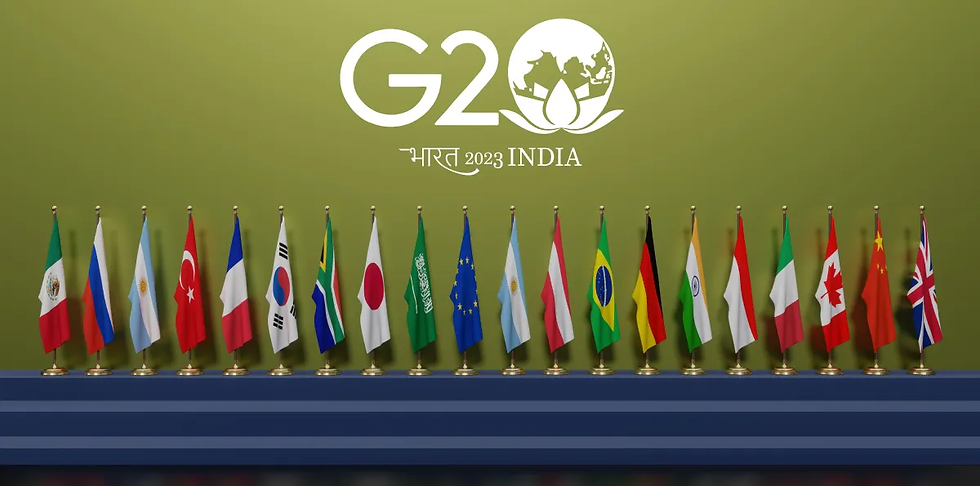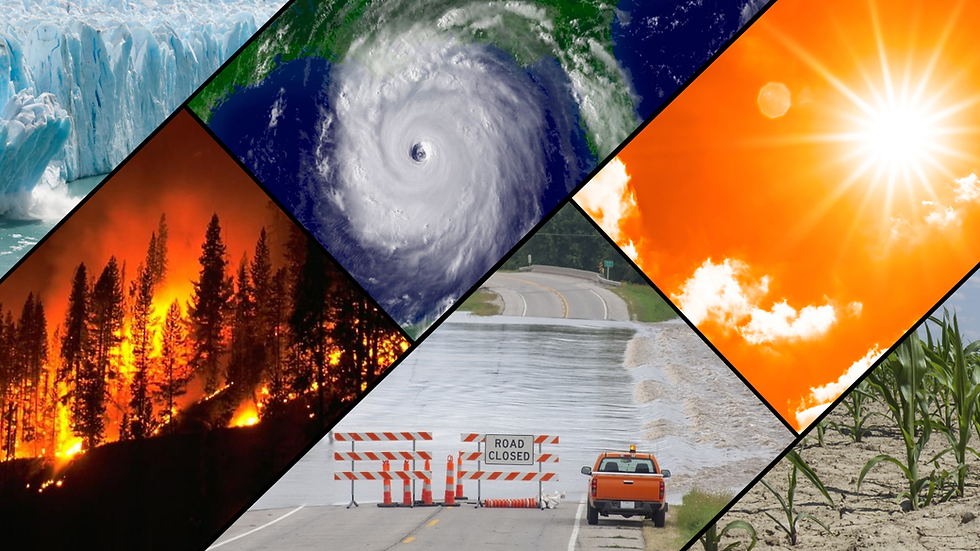In today's dynamic era, where the urgency of addressing climate challenges and promoting sustainable development looms large, it is the indigenous communities, often the most vulnerable, who bear the brunt of shifting weather patterns and resource depletion. In this unfolding narrative of global change, the G20, representing major economies, emerges as a catalytic force for transformative progress.
Embedded within indigenous communities is a profound reservoir of resilience steeped in traditional knowledge. This knowledge is a treasure trove of wisdom, encompassing not only survival mechanisms but also an intrinsic understanding of ecological balance.
It is in this context that the G20's commitment to addressing climate change and nurturing sustainable development finds common ground with indigenous wisdom. This essay embarks on a journey to explore the intricate interplay of climate change, sustainable development, and the G20's initiatives, with a laser focus on enriching climate resilience within indigenous communities through the prism of traditional knowledge.

Source:- https://oecd-development-matters.org/2022/12/05/india-at-the-helm-of-the-g20/
Our expedition into the world of G20 engagements with indigenous communities endeavors to shed light on how these initiatives acknowledge and amplify indigenous voices. Through this, we aim to showcase how these initiatives have the potential to not only elevate climate resilience but also propel sustainable development. The crux of our journey is an evaluation of the G20's efforts within the context of empowering indigenous communities through the prism of traditional knowledge.
As we venture further into this exploration, our path will be illuminated by a comprehensive analysis of specific G20 initiatives. This analysis will unveil the extent to which these global actions translate into tangible benefits for societies that are often marginalized. It will also reveal the degree to which the G20's commitments resonate with the age-old wisdom held by indigenous communities, potentially resulting in amplified climate resilience and progress towards sustainable development goals within these communities.
Climate Change Impact and Indigenous Knowledge
The delicate dance between climate change and indigenous communities demands our unwavering attention. These communities, often nestled in regions that bear a disproportionate brunt of environmental shifts, grapple with socio-economic challenges stemming from unpredictable weather patterns.
Yet, within these challenges lies a beacon of hope. Traditional knowledge, deeply rooted in local ecosystems, transcends the mere act of survival. It offers an all-encompassing worldview intricately interwoven with the environment, forging pathways towards harmonious coexistence. Practices such as crop diversification and disaster preparedness, passed down through generations, empower indigenous groups to navigate the turbulent waters of climatic uncertainty. Furthermore, this knowledge serves as a bridge, transferring the stewardship of their fragile ecosystems from elders to the youth.

Source:- https://www.noaa.gov/education/resource-collections/climate/climate-change-impacts
The global significance of traditional knowledge finds resonance with the sustainable development agenda. It forms a vital nexus, harmonizing modernity with tradition, and aligning the G20's efforts with the Sustainable Development Goals (SDGs) and climate change mitigation.
Indigenous Knowledge and Climate Resilience
It is no accident that indigenous communities possess an unparalleled understanding of their local ecosystems. This understanding equips them to not only anticipate but also adapt to and mitigate the impacts of climate change. This invaluable knowledge, passed down through the annals of time, provides the bedrock upon which strategies for safeguarding communities and resources are built.
Traditional practices such as agroforestry and biodiversity conservation have far-reaching implications. They enhance the overall health of ecosystems and significantly contribute to climate change adaptation. Recognizing and integrating these indigenous perspectives into the G20's efforts is not just a matter of policy; it is a testament to respecting their rights, amplifying their invaluable contributions, and empowering them as agents of positive change.
Synthesis: Paving the Way for a Sustainable Future
The challenges posed by climate change intersect dramatically with the traditional lifestyles of indigenous communities. This intersection amplifies issues such as food insecurity and cultural erosion. Yet, within the fabric of traditional knowledge lies a tapestry of adaptive strategies that can fortify climate resilience.
Traditional knowledge acts as a bridge between the ancestral wisdom of indigenous communities and the global sustainability efforts. It enriches the broader narrative of global sustainability, reinforcing the idea that modernity and tradition can harmoniously coexist.
Evaluation of G20's Initiatives
Within the arena of addressing climate change and sustainable development, the G20 undoubtedly plays a pivotal role. The G20 has endorsed the Paris Agreement, delineating Nationally Determined Contributions (NDCs) aimed at reducing emissions. However, a critical lens reveals that the integration of indigenous perspectives within the G20's policy frameworks remains sporadic, requiring a fundamental paradigm shift towards comprehensive inclusion.
Recognizing the intrinsic value of indigenous perspectives necessitates the forging of authentic partnerships. These partnerships should not merely be symbolic but should empower indigenous communities to become active contributors to these global initiatives. In summary, while the G20's initiatives bear witness to their dedication to sustainability, it is in the embrace of indigenous knowledge within their policy framework that we see the potential for catalyzing innovative solutions and elevating holistic sustainability to new heights.
Integration of Indigenous Wisdom into Contemporary Climate Approaches
The fusion of indigenous traditional knowledge with modern climate strategies is akin to a harmonious symphony where heritage and innovation dance together. In this section, we journey through instances where indigenous insights converge with climate and sustainable development approaches. These instances not only exemplify the advantages of incorporating indigenous practices on a global scale but also emphasize the transformative power of collaboration in enhancing resilience and sustainability.
Take, for example, the case of India, where indigenous practices such as "Jivamrita" and "Beejamrita" exemplify the integration of ancestral wisdom with modern sustainability. These organic farming techniques not only enhance soil fertility but also mitigate ecological impacts.
In the Nilgiris region of India, a collaborative effort is revitalizing traditional water harvesting systems known as "Oorani." This initiative contributes not only to water conservation but also revitalizes traditional knowledge. It's a compelling showcase of how indigenous insights, when woven into the fabric of contemporary expertise, can offer solutions to pressing challenges such as water scarcity.
Such collaborations are rooted in deep respect for indigenous rights and traditions. They amplify indigenous contributions and empower them as true agents of positive change. Furthermore, these collaborations foster a two-way exchange of knowledge, enriching global climate strategies in the process.
G20's Engagement with Indigenous Communities: A Critical Appraisal
The G20's pursuit of climate change mitigation and sustainable development while integrating indigenous concerns invites a critical appraisal. A detailed analysis of the G20's interactions with indigenous communities uncovers areas that require refinement and improvement.
Among the challenges encountered, a primary one revolves around the acknowledgment and incorporation of indigenous traditional knowledge into policy frameworks. Indigenous insights into resource management, climate adaptation, and ecological conservation are often marginalized, hindering their full potential.

Source:- https://economictimes.indiatimes.com/news/india/g20-india-plans-science-20-side-events-next-year/articleshow/95628556.cms?from=mdr
The G20's predominantly top-down approach struggles to encapsulate the rich tapestry of diverse indigenous cultures and their unique ecosystems. A pivot towards strategies involving direct engagement with indigenous communities is imperative. Additionally, financing hurdles pose a formidable barrier, obstructing the flow of funds towards grassroots initiatives that aim to harmonize traditional knowledge.
Towards Inclusive Evolution
The path forward calls for a recalibration of strategies, aimed at the seamless assimilation of indigenous knowledge and the elevation of indigenous voices from mere beneficiaries to co-creators. This transition is not just desirable; it is pivotal in realizing the full potential of indigenous wisdom in the context of global sustainability.
Ecofeminist Lens and Indigenous Knowledge in Sustainable Development
The intersection of ecofeminism with indigenous knowledge amplifies the resonance of sustainable development. This synergy becomes evident through the work of visionaries like Vandana Shiva, who intricately weaves her ecofeminist perspective with the timeless wisdom of indigenous cultures.
The significance of indigenous wisdom for sustainable development becomes even more pronounced when viewed through Shiva's ecofeminist lens. Indigenous cultures inherently embody principles of reciprocity, reverence for nature, and symbiotic cohabitation. These principles provide a compelling alternative to resource-driven models that have dominated the discourse on sustainable development for far too long.
Strengthening G20's Approach: Leveraging Indigenous Knowledge for Comprehensive Sustainable Development
To ensure that indigenous knowledge continues to shine as a beacon of hope within the broader context of sustainable development, the G20 can take pragmatic steps. These steps include formulating inclusive policies, fostering collaborative research, establishing funds dedicated to indigenous-led initiatives, and safeguarding the rights of indigenous communities.
By incorporating these measures, the G20 not only amplifies the wealth of indigenous wisdom but also propels itself toward a more inclusive and effective strategy for sustainable development. This approach reaffirms the G20's commitment to fostering a harmonious coexistence between modernity and tradition, acknowledging that indigenous knowledge is an invaluable asset in this endeavor.
Merging Wisdom for a Sustainable Horizon: Crafting a Collaborative Path Forward
Our journey through the intricate landscape of climate change and sustainable development culminates in the harmonious interplay of indigenous wisdom and the G20's global initiatives. This fusion, guided by ecofeminist principles, offers a transformative path characterized by inclusivity, resilience, and sustainability.
This essay has been a voyage, illuminating the challenges faced by indigenous communities and the multifaceted engagement of the G20. We've intricately woven threads of holistic approaches and ecofeminist principles into our narrative, showcasing the intrinsic value of indigenous knowledge.
The harmonious fusion of indigenous wisdom with global aspirations orchestrates a symphony of harmony, resilience, and inclusivity. This essay embodies a deliberate stride toward sustainable progress, intertwining age-old insights with modern imperatives.
As we conclude, this essay serves as an overture to a broader symphony of collaboration. It signifies the potential of indigenous communities, the G20, and the global community coming together in a shared voyage toward sustainable development. This collective effort harmonizes our shared aspirations for a brighter future.
Weaving the Tapestry of Tomorrow:
In the words of Chief Seattle, "The earth does not belong to us; we belong to the earth." These words encapsulate the essence of indigenous wisdom and its resonance with the G20's pursuits.
Every step, whether it honors tradition, integrates ancestral insights into policy, or safeguards our planet's heritage, adds vibrant hues to our shared masterpiece.
It's a legacy co-created, paying homage to the past while sculpting a sustainable and harmonious world for generations to come.
Article by:- Arshnoor Kaur




コメント